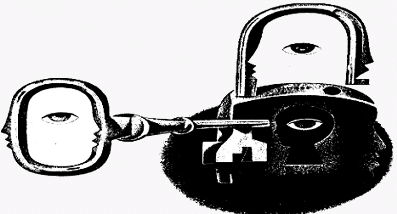|
|
Jewish World ReviewOct. 14, 1998 /24 Tishrei, 5759
Clarence Page
WASHINGTON — We Americans value our diversity, but we don't like to be reminded of it too much.
Such is the clear, yet conflicting message Americans sent recently in a poll on the value of diversity education on campus.
Almost all (93 percent) of the respondents to the poll conducted by the Ford Foundation's Campus Diversity Initiative felt that preparing students to function in a more diverse society is an important goal of colleges and universities.
But they were, by no means, united in their feelings about how that preparation is being accomplished.
More than half of us (58 percent) believe America is growing apart, not together. Yet, many more (75 percent) said efforts to diversify campuses have more of a positive than a negative effect on the education of students.
Similarly, about half (47 percent) said "educators should put more emphasis on teaching common American values than on teaching people about each other's cultures, background and lifestyles."
Yet, a larger percentage (69 percent) agreed that "courses and campus activities that emphasize diversity and diverse perspectives have more of a positive than a negative effect on education."
It's not schizophrenia, it's just "ambivalence" said Daniel Yankelovich, chairman of DYG Inc., which conducted the study. Sometimes, he explained, people agree with directly opposing statements when they, too, are conflicted.
So, why are Americans so ambivalent? Partly because we are Americans. We Americans have been ambivalent about our diversity ever since the wealthy white men who founded this nation organized it around a belief in human rights and equality that they found easier to articulate than to enforce.
Today, centuries and a civil war later, we know from experience that we need to talk about our differences and learn from them if our diversity is to be an asset, not a liability.
But the mere sacrifice of the presumption of white supremacy or male supremacy is enough to make ethnic studies or women's studies sound threatening to some.
On the other hand, conservative critics are right when they say that ethnic studies and women's studies should not become "victim studies."
I have seen too many black students turn to black studies, for example, in search of a place to feel good about themselves by feeling bad about what others have done to them or their ancestors.
There is a lot more to us African-Americans than our victimization. The best African-American studies programs emphasize the positive achievements, without forgetting the negative, including stories of what black people have done to hurt themselves. The best lessons diversity studies can offer are not only the victim stories, but also the victory stories, the stories of triumph, often achieved in alliance with other groups.
Americans also are ambivalent about diversity studies because many of us don't like to admit there is anything we don't know, especially about race, gender or ethnicity.
Yet, as my schoolteacher grandmother used to say, you're never too old to learn. I experienced a dramatic illustration of that last summer as a guest speaker at the Native American Journalists Association convention in Phoenix.
I was invited to offer lessons from my experience as an African-American working in major media. But I soon learned a lot more than I taught.
When I referred to blacks, American Indians and "other minorities," for example, I was corrected by a Sioux elder. "We are not a minority," he said. "We are autonomous nations."
I knew that. But, until that moment, the full weight of that special status, steeped in bloody history, tribal integrity and broken promises, had not hit me. I wanted to know more about the American Indian experience, not only in history, but also today, when too many residents of reservations continue to live in Third World conditions, a legacy of their unique history.
It was one of those rare but valuable moments in which I realized how I could not know much about myself as an American until I learned more about all of the people who make up America, including the original Americans.
The greatest value of our diversity is the opportunities it offers us Americans to move from one world to another and back again. When we deny ourselves that opportunity, we cheat ourselves. If we deny it to the college youths who will inherit America's leadership, we will cheat America's
 Why Americans love and fear 'diversity'
Why Americans love and fear 'diversity'
 For example, about half of the respondents (48 percent) believed diversity education "emphasizes our differences and breeds conflict." But many more (81 percent) agree that "diversity education creates respect for differences and helps ease tensions between people."
For example, about half of the respondents (48 percent) believed diversity education "emphasizes our differences and breeds conflict." But many more (81 percent) agree that "diversity education creates respect for differences and helps ease tensions between people."

10/08/98: How Center-Left liberals got their groove back
10/02/98: Why men are angrier at Clinton
9/28/98: 'Whole truth?' Not in Washington
9/14/98: Coffee? Tea? or Peanut-free?
9/09/98: When love life is affair game
9/02/98: Whose history?
8/31/98: Taking the prize for selfishness
8/24/98: Wag the Dog novelist: Clinton could have looked 'presidential,' but muffed it up!
8/19/98: Resign, Mr. President ... and do it quickly!
8/17/98: Doing kids' time for adult crimes
8/13/98: When blacks are taken for granted....they become Republicans
8/10/98: A place for 'pro-choice' and 'anti-abortion' to agree?
8/06/98: Finding those who fell off the welfare rolls
8/03/98: A list about lists
7/23/98: Teen pregnancy has declined --- but it's not enough
7/21/98: Calling Rev. Al's bluff
7/16/98: Child porn vs. Internet rights; drawing fine lines
7/13/98: Still partners after all these years
7/8/98: A future without 'unknown' soldiers
7/6/98: Suddenly Drudge doesn't look so bad
7/1/98: Get off your, uh, couch, America!
6/29/98: Have conservatives won the media game?